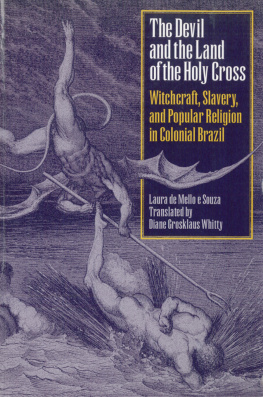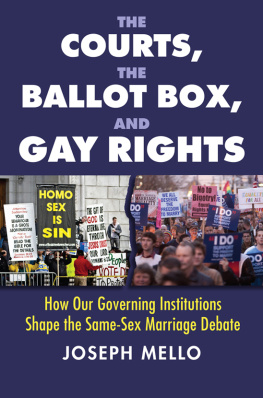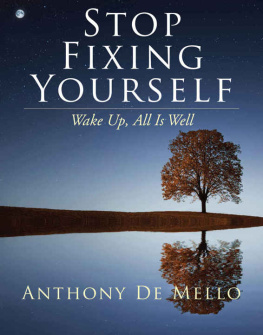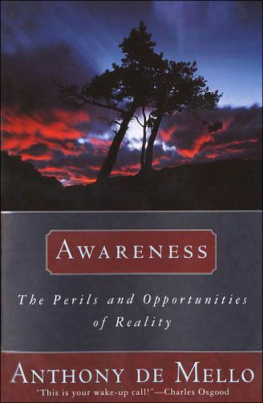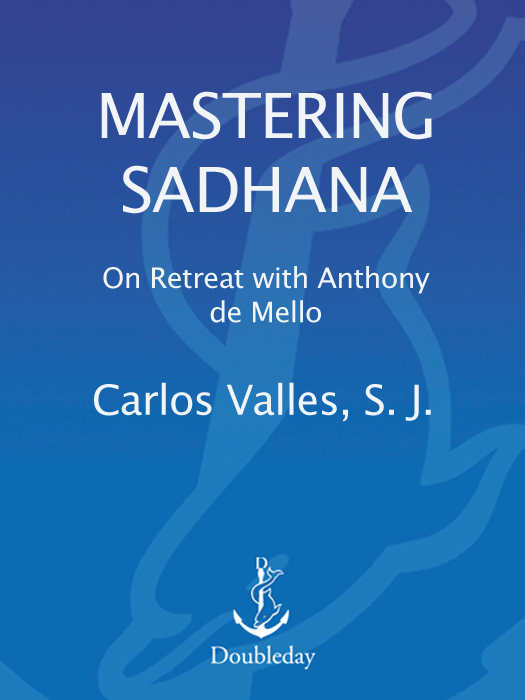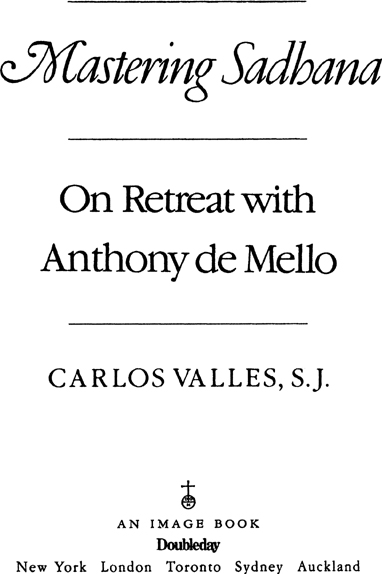Thinking of you,
Tony,
master and friend
Contents
To American Readers
In preparing the American edition of this book I am faced with a dilemma. Tonys audiences in India were different from those in America, and consequently the expression of his thought varied also. Should I, then, present to America his thought as he presented it in India, or adapt it to its American version? In India Tony, apart from general workshops or open seminars, worked with small groups for several months together. In America he had much larger audiences and shorter courses. These different settings made for different approaches. When his listeners were few and the courses long, Tony went into details and worked out matters which required time to assimilate as they might be new and unfamiliar to the audience. In a shorter time and with a large audience he could not hope to be able to clarify ideas and clear possible misunderstandings, and so, sensitively, he refrained from touching upon such points.
One such point, and an important one, is the doctrine of the non-self. Few people in America have heard Tony explain that matter, though that was the center of his latest teaching. To most people it sounds new and strange, and a short exposition could create confusion instead of giving light. A very perceptive American reader who has read this book in typescript (as prepared for the Indian edition) has even suggested the advisability of dropping the whole chapter on The Self and the Non-Self from the American edition. When hearing that considered opinion I felt quite ready to suppress the chapter, as I am not attached to what I have written for its own sake. True, the book would then lose its climax, but if by losing it, it gains in clarity and acceptability, I am prepared to let it go. I also feel, however, that dropping this matter altogether would be unfair to Tony, as it evidently meant much to him and gave consistency to his thought and practice. It would also be unfair to American readers who have a right to know Tonys thought in as complete a way as possible. Omission of this point would seriously mutilate Tonys thinking, and, after consideration, I think it better to risk some misunderstanding than to suppress a substantial portion of his teaching.
The chapter, then, stands, as the ideas, the meaning, and the emphasis are Tonys, and so are almost the very words which I took down in detailed notes. It has to be taken in the context I painstakingly elaborate in the whole book, before and after that chapter, to avoid any one-sided interpretation. What would certainly be one-sided, on the other hand, would be to take only the Tony of the large audiences, ignoring the Tony of the small intimate groups. The two aspects of Tony complement and enrich each other, and the specific contribution of this book can be to throw light on the private Tony while his books, tapes, and videos focus on the public one. If any reader finds any part of this book unhelpful, he or she will do well to ignore it, and give the benefit of the doubt (if any arises) to Tony and, I hope, to me whose only endeavor is to be faithful to Tonys thought.
A similar consideration applies to the words selfish, greedy, vicious, stupid, innocent, and blameless which give rise to another difficult chapter. Abstract philosophy was never Tonys strong point, and some of his expressions, if pushed to technical extremes, could cause difficulty. When he stressed a point, he did it so convincingly that an unwary listener might lose sight of the other side of the question, necessary for the proper balance. Tonys dialectics used the coincidence of opposites of Nicholas of Cusa, expression which he very often quoted, and to bring it out, he would forcibly present now one extreme, now another (as, in this case, mans freedom and circumstances conditioning determinism), and leave the listener the task of finding his own balance in the middle. He gave shock treatment to people to shake them out of routine in their thinking as much as in their behavior, but those shock waves must be understood as pedagogical rather than ideological. Readers of this book will, no doubt, exercise the sense we, as listeners, exercised in Lonavla, and place themselves in the right perspective for a balanced view.
I heard Tony say, Dont give people more than they can take but open a little window that they may think. He did precisely that. Now, it is easy to fix the size of the window in individual counseling or in a small group, difficult in a large group, and impossible in a book that may find its way into anybodys hands. That is why Tony in his books resorted to stories rather than essays, and spoke in parables as Jesus did. I state here in all honesty that I have deliberately left out of this book some things Tony actually said in a small group but, in my judgment, would not have said to a large audience; while, at the same time, I have endeavored to mention all that I felt was truly important in his thought. To draw the line has, at times, not been easy, and I may have erred occasionally on one side or the other. That is the price I have to pay for attempting to describe Tonys teaching systematically, and I am willing to pay the price. Only let not those limiting cases obscure the vision of the whole.
The fact that Tony said things in private which he would not say in public was only practical prudence, and by no means a maneuver to hide doubtful teaching. Tony was a staunch Catholic (in India we say that being a Goan is more, in the scale of orthodoxy, than being a Catholic, and Tony was a Bombay-born Goan!), and his thought was always shaped by his profoundly Christian faith. He dedicated the first of his books to Our Lady, the second to the Church, Mother and Teacher, and the third to the Jesuit Order, while in its first page he declared himself to be a disciple of Jesus Christ. Precisely because of the great faith he had in his Christian convictions he could go out in sympathy to other doctrines and other experiences and assimilate all that was good and valid in them into his own Catholic practice. He could be openly ecumenical because he was unmistakably Christian.
I am a witness of the special regard and affection Tony had for America and all the people he had come to know and love there, and I want to record it here for the American readers of this book. While I was discussing his plans for 1987 with him, he mentioned that he planned to go twice to the States, once in summer for a number of courses, and once in November, this time only for the very brief but very fruitful ministry of the Satellite Retreat where thousands of people heard him live and could ask him questions from all over the United States and Canada. He then added that this would be a very short trip, and that he found that tiring (he disclosed to me that he had to take sleeping pills during his intercontinental plane jouneys) and that this particular activity did not bring him much money (which he needed for the building of the new Sadhana Institute); still, he went on, he was undertaking that journey most willingly as a service to his friends in the States to pay the Americans for all they do for me which is more than I can say. His death in New York links him forever to America in earthly embrace. In that same spirit, and knowing that in doing this I am doing something that would certainly please him, I offer this book to the American readers.
C ARLOS G. V ALLES
S.J. St. Xaviers College



